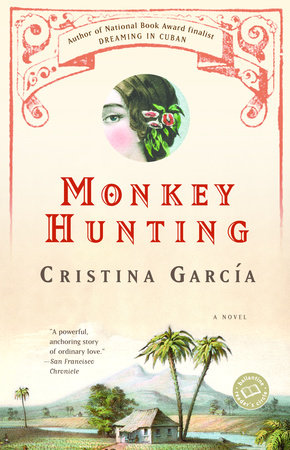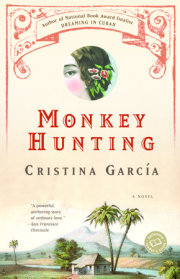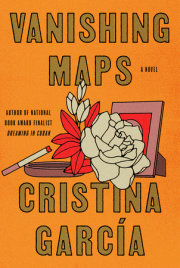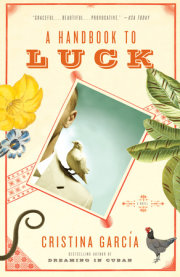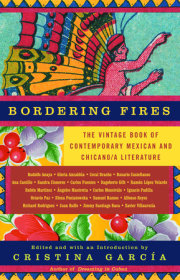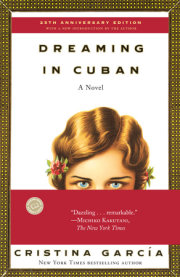To Paradise
Amoy to Aavana
(1857)
There were other men like Chen Pan on the ship, not too young, but not too old either. From the farms, mostly, as far as he could tell. No weaklings. Cuba, the man in the Western suit had told him, needed sturdy workers. Chen Pan was taller than most of the recruits, and his arms were taut with muscles. His hair was tied back in a thick queue, but at twenty years old he barely needed to shave.
A few families came to see their men off. The women gave their husbands sticky rice balls and packets of seeds for their journey. There was no weeping. Even the smallest children were dry-eyed. Most of the men, like Chen Pan, went aboard alone and empty-handed.
That evening at sea, the coast of China gradually faded behind them. A haloed moon rose on a swell of wind, but this hopeful omen didn’t alter the facts of the ship. It was outfitted like a prison, with irons and grates. The recruits were kept belowdecks, like animals in a pen. The shortest among them couldn’t stand upright. Soon Chen Pan’s neck ached from stooping.
Neither the British captain nor his crew spoke much Chinese. The captain issued his orders with a flat expression and a wave of his girlish hands. His crew was far more unruly. They threatened the re- cruits with muskets and cutlasses and rattan rods, shackled those whom the rods didn’t tame. Chen Pan was struck with a hoisting rope for requesting an extra blanket.
Those men who’d brought food or tobacco on board began to barter and sell. These boiled chicken feet for your hemp sandals or your uncle’s flute. A handful of pumpkin seeds for your stash of turnips or hard-boiled eggs. A day’s opium for the woolen gloves. Gambling sprouted like snake-grass in every bunk. The incessant clicking of dice finely divided the hours. A man from W—— gathered most of the winnings and crowed, “If you were too dumb the life before, you won’t be enlightened today!”
After his misfortunes in Amoy, Chen Pan refused to gamble. He guarded his Mexican coins, tucking them between the meager cheeks of his buttocks for safekeeping.
The men got beef jerky and rice gruel to eat. Chen Pan ate, although the taste of the food sickened him. It was oversalted, and the lack of adequate water made him desperately thirsty. Hour after hour, he thought more of his shoe-leather throat than of the life awaiting him in Cuba. Those who demanded more water were answered with blows. Chen Pan watched men drink their own urine, lick moisture from the walls of the ship. A few swallowed seawater until their stomachs swelled and they choked in their own filth.
A squat melon-grower from T—— announced that he would throw himself into the ocean to end his torment. Chen Pan crept on deck with two others to watch him jump. The melon-grower didn’t shout or linger but simply stepped into the breeze. A moment later, the furling waves received him with indifference. The melon-grower had been an orphan and a bachelor. No destiny would be altered but his.
The ship continued to plow south into the hard-gusting wind. Chen Pan covered his ears so they wouldn’t blow away altogether. He asked himself four questions: What was the last sound the melon-grower heard? The last color he saw before he died? How long would it take for the fish to devour him? Would this death complete his fate? “Show me the person who doesn’t die,” shrugged a short-legged man next to Chen Pan.
This was something Chen Pan’s father used to say, that death alone remained impartial. All the towering men, all the great beauties with kingfisher plumes in their hair—not a single one expected to grow old. But they, too, would return to dust. If it was true that man had two souls, one of the body and the other ethereal, then they would merge with the earth and the air after death.
Chen Pan knew that he didn’t want to fade away slowly, like a dying candle—one day no different from the next; the dirt etched in his hands along with his fortunes. No, he would rather live in a blaze of courage and flame like Li Kuang, the ferocious warrior who’d battled the Huns, or the heroes in the stories his father had recounted to him.
Chen Pan’s father had been as restless as these heroes, never reconciling himself to a life on their farm. He’d recited the Songs of Wu as he’d absentmindedly hoed the wheat fields, grew devoted to the poetry of the deserted concubines of the Han court. He’d referred to the sun as the Lantern Dragon, the Crow in Flight, the White Colt. The moon was the Silver Dish or the Golden Ring.
Father had taken the Imperial examinations for twenty years without success. He’d been a good poet but incapable of composing verses on assigned subjects, as was required by the examiners. He’d blamed his absorption of useless knowledge for overburdening his imagination. Before picking up his brush to write, he would rub his inkstick on a whetstone for a meditative hour as Chen Pan watched.
Chen Pan’s mother ridiculed her husband as she hobbled from room to room on her lotus feet. “Ha! Everyone calls him a scholar, but he hasn’t found a position yet. And in winter he wears a thread- bare robe. This is how books fool us!” Chen Pan’s mother was from a family of well-to-do farmers, and far from beautiful. She knew little poetry, but used to repeat the same line to nettle her improvident husband: Poets mostly starve to death embracing empty mountains!
After ten days of cramped, stinking squalor, a fight erupted belowdecks. A city man named Yang Yün, contrary as a donkey, shoved a quiet farmer out of his bunk. “Son of a whore!” the farmer shouted, punching Yang Yün in the chest. The city man pulled a knife from his vest and silvered the air with reckless slashing. The farmer disarmed him in no time, then promptly broke his nose.
Chen Pan watched the fight from behind his tattered book of poems, a last gift from his father. He decided that if Yang Yün or any of the other city cocks so much as jostled his elbow, he would knock them unconscious with a blow.
The captain’s guards chained the troublemakers to iron posts. Others who’d cheered them on were flogged to intimidate the rest. When the stubborn Lin Chin resisted, the guards kicked him in the ribs until he spat blood. The next day he died and his body was dumped in the sea. It was said that Lin Chin didn’t sink at first but floated alongside the ship for hours, his eyes fixed on the sky. Chen Pan wondered if the dead man’s ghost would find its way back to China. Or would it wander forever among the unvirtuous and the depraved?
As the ship continued to sail, Chen Pan imagined his wife pounding the season’s meager yield of grain in their yard, looking warily to the sky for rain. They’d been married for three years but had no children. Unlucky, despite what the matchmaker had predicted. On their wedding night, Chen Pan and his wife had drunk pomegranate wine and she’d grazed his chest with her soft, scant breasts. But month after month her womb spilled its blood.
Chen Pan’s mother blamed his wife for ruining the family with her persistent barrenness. Weak and sallow-skinned, Mother ruled the farm from her bed, knees tucked to her chest, lotus feet curled and useless from the painful binding long ago. In her closet were three minuscule pairs of jeweled slippers, all that remained of a dowry once rich with silks and brocades.
She also chastised Chen Pan’s younger brother for spending his days writing with his one brush and inkpot. “Even from the grave, your father has cursed you with his useless ways!” In winter, their house grew so cold that his small supply of ink froze.
On board, the recruits began to suffer every manner of illness. Cholera. Ty- phus. Dysentery. Bad luck, Chen Pan decided, had settled into every crevice of the ship. Nine men died the first month, not counting those killed in fights or beaten to death by the crew. Many more might have perished but for Chien Shih-kuang, sorcerer of herbs and roots. With his felt bag of magic, the wry herbalist from Z—— brewed teas to mend every imbalance, quieting fiery livers, warming cold organs, restoring the temperamental ch’i.
The captain had promised Chien Shih-kuang payment of passage back to Amoy in return for his services on board. The herbalist had agreed because he’d heard that in Cuba men knew the secret to halting the winter retreat of the sun. He, too, wished to learn this secret.
One night Chen Pan dreamed that bandits had set fire to his great-aunt’s farm and that he alone was battling the flames. He woke up delirious, his skin hot and itchy. Chien Shih-kuang plastered a five-pointed leaf on Chen Pan’s forehead with a few drops of a caustic liquid. When his fever broke, Chen Pan tried to pay the doctor with one of his precious Mexican coins, but Chien Shih-kuang refused it. (Years later, Chen Pan would learn that the herbalist had married a Spanish heiress in Avila and generously cured the poor.)
But not even Chien Shih-kuang could save the poor suicides. Chen Pan counted six altogether. Af- ter the melon-grower, another man jumped into the sea. One more poisoned himself with stolen opium. A boy, no older than fifteen, passed his days and nights in tears. He confided to Chen Pan that he was in great grief over having been decoyed on board. “I’m the only child of my parents!” he cried before thrusting a sharpened chopstick into his ear. In this way he stopped his regretting.
A native of K—— hanged himself with strips of torn clothing deep in the ship’s hull. (The guards had beaten him savagely for siphoning rainwater from their private barrels.) Chen Pan thought his swaying sounded like the slow tearing of silk. With the winds stiff and the sea wide all around, he asked himself why someone would choose to die so confined and without air. Chen Pan wasn’t certain what made a man ultimately want to live. He only knew that he would survive unless somebody managed to kill him.
The night the Wong brothers died, a squall engulfed the sea. The ship creaked and groaned like a sick man. The storm ripped off a mast and tossed two officers overboard. The men feared that the brothers’ ghosts had cursed the ship, that they were causing the thunder and lightning, the wind from eight directions, the waves as high as the Buddha’s temples. But by morning the sea was calm.
At noon, a pair of whales was spotted off the Cape of Good Hope. Chen Pan clambered to the deck to see the breaching beasts. “Maybe we should kill them and get some fresh meat,” the lazy-eyed Wu Yao suggested. Chen Pan looked at him incredulously. It was obvious that this city boy had never caught so much as a pond carp.
T he rumors spread with every day at sea. A bankrupt tailor pieced most of the gossip together, all the while quoting ancient sayings. Caged birds miss their home forest. Pooled fish long for the deep. Chen Pan listened closely to the tailor, but he didn’t circulate the man’s tidings: that their ship was headed for the Philippines; that every last man on board would be killed there, heart scooped from his chest; that they’d be sold to cannibals who savored yellow flesh.
There was talk of mutiny. Should they behead the captain and crew? Set fire to the vessel? Reverse their course to China? Chen Pan knew there were men on board fit for murder, experienced warriors who’d fought the British barbarians. Arrow-scarred, they’d been dragged from their prison cells to the ship. But the ones who talked loudest were most filled with hot air.
Chen Pan grew increasingly regretful. Had he deceived himself with his own grand dreams? How could he go home poorer than when he’d left? (Already, he imagined his mother’s rebukes.) He tried to concentrate on his return to China a few years hence. A procession of men would follow him, triumphant in his sedan chair, carrying a hundred chests of princely gifts on their shoulders. Enough silk for three generations. New harnesses for the village horses. Countless jars of turtle eggs pickled in foreign wines. The villagers would gather around him, paying him the respect in life that his father had achieved only in death.
Because the days were long and the men so constricted, they entertained each other with stories about the tallest men who ever lived. Chung Lu-yüan, who was fond of lantern riddles, reported of a man who, sitting down, was as big as a mountain and could dam the course of a river with his ass. Hsieh Shuang-chi, a stevedore who was tricked on board by his greedy brother-in-law, told of a giant who drank a thousand gallons of celestial dew for his breakfast.
Chen Pan retold the jokes he’d learned from his beloved great-aunt. His favorite was the one about the evil warlord who’d had the length of his penis extended with a baby elephant’s trunk. Everything went well for the warlord, Chen Pan said, until the day he passed a peanut vendor in the street.
There was also a dwarf on board who could imitate perfectly the sounds of a cassia-wood harp. His name was Yang Shi-fêng, and he sang of his land, where the tallest men grew to no more than three feet. In former times, he said, his countrymen had been sent as jesters and slaves to the Imperial Court. Then Yang Cheng came to govern the land of the dwarves and convinced the Emperor to annul his cruel trade. To this day every male born in T—— has Yang in his name.
Others recounted the tale of the impudent Monkey King. Entrusted with the job of guarding the Im- mortals’ heavenly peaches, the Monkey King heartily partook of them instead. One transgression followed another, but none of the Jade Emperor’s emissaries could catch the fearless simian. Finally, the Buddha himself cast a powerful spell that sealed the monkey under a mountain for five hundred years.
On a nearby bunk, a pig breeder from N—— reminded Chen Pan of his father. His hair fluttered with unruly tufts, no matter that the air was perfectly still. The pig breeder shared the last of his wife’s pickled cabbage with Chen Pan. The taste made them both terribly homesick. Chen Pan recalled the long summer afternoons his father had read poems to him, their plows left untouched in the shed. Before long the cicadas would sing, signaling the onset of autumn.
These lovely seasons and fragrant years falling
Lonely away—we share such emptiness here
When Chen Pan was thirteen, bandits had murdered his father for protesting the rape of the water-carrier’s daughter. She was only ten, pretty and dull, and willingly had shown the bandits inside her neighbor’s granary. Father’s legend swelled and the villagers recounted his heroism, but Mother disputed their accolades. “What father leaves his children noth- ing but his good reputation to eat?” She scolded her sons to learn this lesson: “Avert your eyes to the sorrows of others and keep your own plates full!”
After three months at sea, Chen Pan’s arms and legs grew soft and white as the flesh of the rich women he’d glimpsed in Amoy. Often he fantasized about these women, inhaled the scent of their lacquered hair, slowly dared to love them. He recalled the tales of the women of the old Imperial Court, who were protected by the Emperor’s purple-robed eunuchs. Alluring women swathed in furs and jade, their gauze-silk sleeves blooming like orchids. Delicate women who drank only camel-pad broth and nibbled on rare winter fruit to maintain their complexions. Women best admired from afar, like the mountain mist.
Sometimes the men spoke wistfully of the road- side flowers who awaited them in Cuba, easy amber- colored whores who opened their legs for their own pleasure, expecting nothing in return. For all that it had cost him, Chen Pan couldn’t remember his one night with the dancing girl in Amoy. There were only the memories of his mournful wife.
The ship passed through the Straits of Sunda without incident, then followed the verdant curve of Africa before veering west across the Atlantic. In St. Helena they stopped for fresh water, continuing on to Ascension, Cayenne, the Barbadian coast, and Trinidad. Chen Pan heard the crew announcing each port of call, but the longer he remained on board, the farther away Cuba seemed. Could his eight years of servitude have elapsed already?
When the ship finally reached Regla, across the bay from Havana, Chen Pan climbed to the top deck to get a better view. It was a hot, sunny morning, and the city looked like a fancy seashell in the distance, smooth pink and white. A brisk wind stirred the fronds of the palms. The water shone so blue it hurt his eyes to stare at it. When Chen Pan tried to stand on the dock, his legs slid out from under him. Others fell, too. Together, he and his shipmates looked like a spilled barrel of crabs.
The men were ordered to peel off their filthy rags and were given fresh clothes to present themselves to the Cubans. But there was no mistaking their wretchedness: bones jutted from their cheeks; sores cankered their flesh. Not even a strict regimen of foxglove could have improved their appearance. The recruits were rounded up in groups of sixty—wood haulers and barbers, shoemakers, fishermen, farmers— then parceled out in smaller groups to the waiting landowners.
A dozen Cubans on horseback, armed with whips, led the men like a herd of cattle to the barracón to be sold. Inside, Chen Pan was forced to strip and be examined for strength, like horses or oxen that were for sale in the country districts of China. Chen Pan burned red with shame, but he didn’t complain. Here he could no longer rely on the known ways. Who was he now without his country?
One hundred fifty pesos was the going rate for a healthy chino. A Spanish landowner paid two hundred for him, probably on account of his height. His father had taught him that if you knew the name of a demon, it had no power to harm you. Quickly, Chen Pan asked one of the riders for the name of his buyer. Don Urbano Bruzón de Peñalves. How would he ever remember that?
Several landowners tried to cut off the queues of their hires. Those who protested were beaten. Chen Pan was relieved that his employer didn’t insist upon this. Now there was no question of his purpose in Cuba. He was there to cut sugarcane. All of them were. Chinos. Asiáticos. Culís. Later, there would be other jobs working on the railroads or in the copper mines of El Cobre, five hundred miles away. But for now what the Cubans wanted most were strong backs for their fields.
Copyright © 2003 by Cristina Garcia. All rights reserved. No part of this excerpt may be reproduced or reprinted without permission in writing from the publisher.

